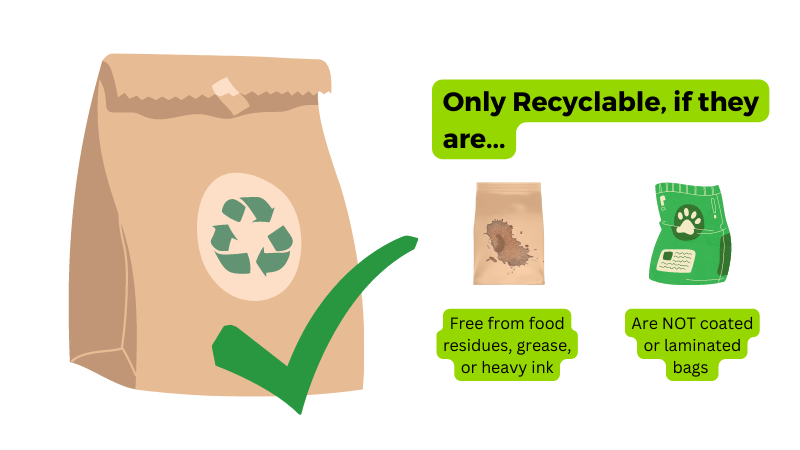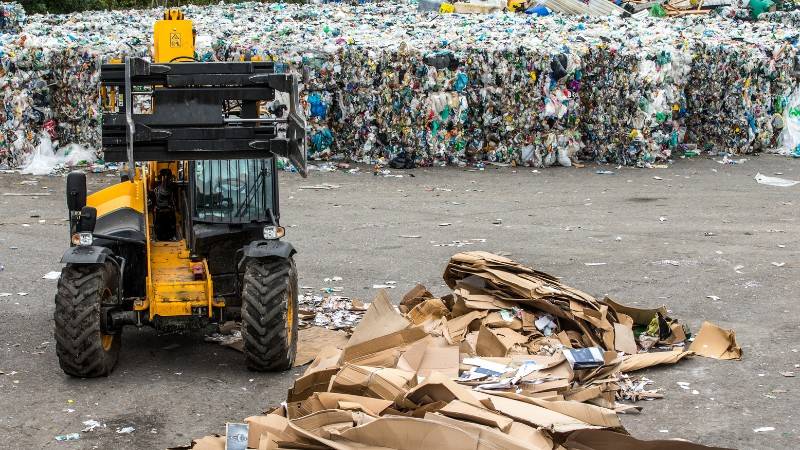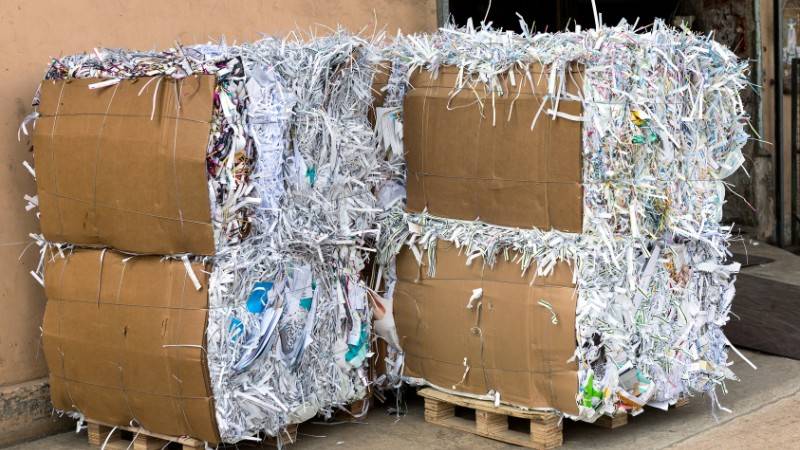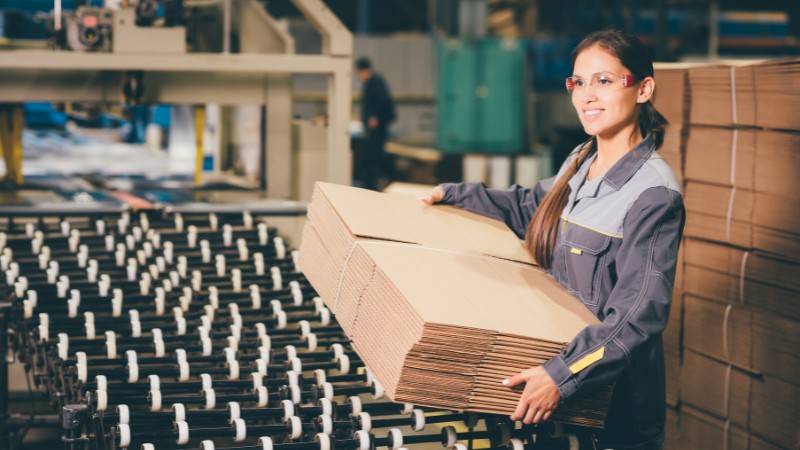In the early 1850s, paper bags began their journey, marking a pivotal invention for convenient shopping. Fast forward to today, and these bags have staged a significant comeback, mainly as a ‘greener’ alternative to their plastic counterparts.
As the world leans into sustainability, more and more of us are reaching for paper bags at the checkout line. In fact, the sales of paper bags has increased 400% in the last five years!
But here’s a question we should all be asking: Are paper bags recyclable?
With this article, I aim to peel back the layers of this question and clear up any misconceptions you might have. I’ll provide a comprehensive understanding of paper bag recycling and what it means for our planet.
Let’s dive into the facts and explore this sustainable journey together.
Can You Recycle Paper Bags?
Yes, paper bags are generally recyclable. Unlike their plastic bag counterparts, paper bags can be tossed into your curbside recycling bin, as long as your local recycling program accepts them. Typically, they are processed with mixed paper at recycling facilities, where they are broken down into fibers, cleaned, and eventually turned into new paper products.
However, it’s not as simple as just throwing all paper bags into the recycling bin. For a paper bag to be recyclable, it needs to be clean and free from contaminants like food residue, grease, or heavy ink.

So, those used paper bags that once housed your takeout dinner?
They might be better suited for the compost bin if they’re stained with grease.
Moreover, it’s important to remove any non-paper components, such as handles or strings, before recycling. Some recycling programs might have additional rules or exceptions, so it’s essential to check with your local facility.
In essence, while paper bags are designed to be recycled, the process requires a bit of due diligence on our part. We need to ensure we are recycling right, helping rather than hindering the process.
The Recycling Process of Paper Bags
How Are Paper Bags Recycled?
Recycling paper bags is a fascinating process, one that turns old products into something new and usable again. Let’s break it down step by step:
- Collection: Paper bags are collected from curbside bins or drop-off locations and then transported to recycling facilities.
- Sorting: At the facility, bags are sorted from other recyclables, usually by a conveyor belt system.
- Pulping: Sorted paper bags are mixed with water and chemicals, which helps to break them down into fibers. This mixture is called ‘pulp.’
- Cleaning: The pulp is cleaned to remove any contaminants (like plastics or metals), which are then sent to be disposed of appropriately.
- Deinking: If necessary, a deinking process removes inks and dyes from the pulp.
- Refining: The clean pulp is refined, meaning it’s beaten to make the paper fibers swell.
- Forming and Pressing: The pulp is then spread onto a screen, allowing the water to drain and forming a mat of paper fibers. It is pressed to remove additional water and then passed through heated rollers to form sheets.
- Cutting and Packaging: The sheets of paper are cut into new paper products, including potentially new paper bags, and are then packaged for distribution and sale.
What Types of Paper Bags Can Be Recycled?
There are several types of paper bags, including:
- Kraft (the most common and recognizable brown paper grocery bags)
- Bleached (white paper bags)
- Specialty bags (which might have additional components like handles or coatings)
Generally speaking, the cleaner and purer the paper, the more likely it is to be recyclable.
Key criteria for recyclability include:
- Cleanliness: The bag should be free from food residues, grease, or heavy ink.
- Type of Paper: Plain kraft bags are the easiest to recycle. Coated or laminated bags can be more challenging.
Common Contaminants in Paper Bag Recycling
When it comes to recycling paper bags, certain materials and residues can throw a wrench in the works. Here are some common contaminants:
- Food residues (e.g., grease, sauces)
- Adhesives (e.g., tape, stickers)
- Non-paper components (e.g., handles, metal clasps)
These contaminants can interfere with the recycling process by reducing the quality of the pulp produced. For instance, food residue can be difficult to remove and might result in lower-quality recycled paper. Adhesives can gum up the machinery, leading to costly repairs and downtime for recycling plants.
So, when in doubt, it’s best to keep those bags as clean and pure as possible before sending them off to be reborn.
Environmental Impact of Recycling Paper Bags
Energy and Resource Savings
When I recycle my paper bags, I like to think of it as giving them a second life — and saving some of our planet’s precious resources in the process.
It’s a true win-win.
Recycling paper bags consumes significantly less energy compared to producing paper from raw materials.
Here’s a snapshot:
- Producing new paper demands large quantities of water and energy to process the raw wood pulp. In stark contrast, recycling existing paper products, like bags, can reduce energy use by approximately 40-64%.
- Water use is also drastically lowered when recycling paper, as much as 58% less according to some estimates.
| Resource | Recycling Paper Bags | Producing New Paper |
|---|---|---|
| Energy Usage | 40-64% less | 100% (baseline) |
| Water Usage | 58% less | 100% (baseline) |
| Trees Required | 0 (uses recycled material) | Varies (new trees needed) |
| Greenhouse Gas Emissions | Significantly Reduced | Higher Emissions |
| Air Pollution | Reduced | Increased |
| Water Pollution | Reduced | Increased |
| Solid Waste | Minimal | Substantial |
| Landfill Space Required | Significantly Less | More |
Waste Reduction
The numbers speak loudly here: recycling paper bags significantly cuts down on waste.
For instance, recycling just one ton of paper saves about 3.3 cubic yards of landfill space. And considering the millions of tons of paper products we use every year, that adds up to a monumental difference.

It’s estimated that paper products constitute around 25% of landfill waste in the United States alone. By recycling, we can divert a substantial portion of this waste from landfills.
Impact on Landfills and Pollution
Have you ever visited a landfill? It’s an eye-opener, seeing firsthand the mountains of waste we produce. And paper bags, though seemingly innocent, are part of this issue if not recycled.
When we recycle paper bags, we directly reduce the amount of waste sent to landfills. Fewer landfills mean less soil and water pollution from the decomposing waste and its byproducts.
Less waste in landfills also leads to reduced methane emissions. As paper decomposes in a landfill, it produces methane—a potent greenhouse gas that significantly contributes to climate change.
By recycling our paper bags, we’re not just cleaning up our act on a household level. We’re contributing to a broader effort to combat pollution and preserve the health of our planet. It’s small actions like these that, collectively, make a world of difference.
Challenges and Limitations of Paper Bag Recycling
Recycling paper bags is a commendable action, but it’s not without its hurdles. While we’ve discussed the benefits, it’s crucial to shine a light on some of the challenges involved in the process, too.
Let’s delve into some of the key issues.
Collection and Sorting Issues
Recycling starts at the collection stage, and this is where the first set of challenges often arises.
Paper bags are generally collected through curbside recycling programs or designated drop-off points. However, not all municipalities have comprehensive curbside collection for paper products, leaving it to the consumers to find a drop-off location.

Sorting can be labor-intensive and requires advanced machinery to separate paper bags from other types of recyclables. Errors in this process can lead to the contamination of entire batches of recyclables.
In some instances, paper bags with food residue or grease are thrown in with regular paper recycling, which can contaminate the batch and lead to it being sent to landfills instead.
Market Demand for Recycled Paper Products
One of the biggest drivers — or limiters — for paper bag recycling is the market demand for recycled paper products.
The cycle of recycling depends heavily on end-users — both consumers and manufacturers — choosing products made from recycled material. If there’s no demand, there’s less incentive to recycle.
When demand is low, it becomes less economically viable for recycling facilities to process paper bags, potentially leading to more being sent to landfills.
On a brighter note, there are companies leading the way in using recycled paper products, thereby fueling the demand for these materials.

Read More:
How You Can Contribute to Paper Bag Recycling
Now that we’ve ventured into the complex world of paper bag recycling, let’s bring it back home. Wondering how you, as an individual, can make a significant impact? Trust me, every little bit helps. Here’s how you can be a part of the solution:
Preparing Paper Bags for Recycling
Preparing your paper bags for recycling is one of the first and most vital steps you can take. This simple preparation ensures that your used paper bags are recycled efficiently and effectively.
Here’s your quick checklist:
- Remove Handles: If your paper bags have handles, especially if they are made of a different material (like string or twine), remove them before recycling.
- Ensure Bags are Clean and Dry: Grease or food waste can contaminate an entire batch of recyclables. Make sure your bags are free of contaminants.
- Flatten the Bags: This helps save space in the recycling bin and makes the bags easier to transport.
- Avoid the ‘Bag of Bags’: Don't stuff multiple paper bags into one; this makes sorting harder at the recycling facility.
- Check for Special Coatings or Laminations: Some paper bags, especially gift bags, have coatings that can make them non-recyclable. If in doubt, check with your local recycling program.
Finding Local Paper Bag Recycling Programs
Finding a local program is the key to making your recycling efforts count. Here’s how you can locate and participate in recycling programs near you:
- Check Your Municipal Website: Your city or town’s website is likely to have information on local recycling programs, including what is accepted and where you can drop off your recyclables.
- Call Your Waste Collection Provider: They can provide information on what can be included in your curbside recycling bin and any special instructions for paper bags.
- Visit Recycling Centers: Use online tools, such as the [website name] locator, to find a recycling center near you.
- Connect with Local Environmental Groups: Local nonprofits and community groups often have information on recycling options and may even run their own collection programs.
- Ask at Retail Stores: Some stores, especially grocery stores, have collection bins for paper bags. It’s recycling made easy—just drop off your bags the next time you shop.

So there you have it, my friends. Recycling paper bags isn’t just about putting them in a separate bin. It’s about being mindful and deliberate—taking those few extra seconds to prepare them correctly and finding a convenient and effective way to recycle them.
It’s through these small, thoughtful actions that we can all contribute to a more sustainable and harmonious world.
How to Reuse Paper Bags
Before we even think about recycling, let’s pause and consider reusing. Giving our paper bags a second (or third, or fourth!) life is a fabulous way to extend their value. Plus, it’s a fun opportunity to get creative. Here’s a simple list of various ways you, too, can breathe new life into your paper bags:
- Gift Wrapping: Use them as an eco-friendly alternative to gift wrap. Add a little ribbon, and you’ve got a beautifully wrapped present.
- Craft Projects: Paper bags can be the canvas for your next art project. They’re great for painting, drawing, or scrapbooking.
- Packing Material: Crumple them up and use them as packing material when shipping boxes to protect your items.
- Book Covers: Remember covering your textbooks back in school? Paper bags make excellent, durable book covers.
- Organizing and Storage: Use them to sort and store items like recyclables, shoes, or craft supplies.
- Food Composting: Paper bags are a great addition to a compost pile, where they break down with your food scraps and turn into nutrient-rich soil.
- Lunch Bags: Rather than buying new lunch bags or boxes, simply reuse a paper bag to carry your lunch.
- Weed Control in Garden: Place paper bags at the base of your plants to help prevent weeds from growing and to retain soil moisture.
Paper Bag vs. Plastic Bag - Which is Truly Sustainable?
Ah, the age-old debate: paper or plastic? Which is the real champion when it comes to sustainability? It’s a question I get asked by my eco-conscious friends all the time, and the answer might surprise you. Let’s break down the sustainability factors of both options:
Production Resources and Environmental Impact
Paper Bag
Plastic Bag
- The manufacturing process of paper bags generally requires more energy and water than that of plastic bags. Plus, it involves cutting down trees, which play a crucial role in absorbing carbon dioxide.
- Plastic bags are made from fossil fuels, a non-renewable resource. Their production generates a variety of pollutants and significantly contributes to global greenhouse gas emissions.
Reusability and Durability
Paper Bag
Plastic Bag
- They tend to be more robust and less likely to tear than thin plastic bags, making them more suitable for multiple uses. However, they can tear when wet.
- Lightweight and water-resistant, plastic bags can be reused, but they tend to rip more easily and have a shorter lifespan.
Recycling Rates and End of Life
Paper Bag
Plastic Bag
- They generally have higher recycling rates than plastic bags. Most curbside recycling programs accept paper bags, which can be turned into new paper products.
- Fewer recycling facilities accept plastic bags, and many end up in landfills where they can take hundreds of years to decompose. Some can be returned to specific retailers for recycling, but the rates are comparatively low.
Biodegradability
Paper Bag
Plastic Bag
- If they do end up in a landfill, paper bags decompose much more quickly and naturally, without leaving harmful residues.
- They can take hundreds of years to break down, and as they do, they can release toxic chemicals into the soil and water.
Wildlife and Marine Life Impact
Paper Bag
Plastic Bag
- While paper bags can also contribute to litter, they generally pose less of a threat to wildlife than plastic bags.
- They are notorious for their detrimental effects on marine life and wildlife. Animals can ingest or become entangled in plastic bags, often with fatal results.
The battle between paper and plastic ones isn’t as clear-cut as it may seem. Paper bags, generally speaking, are more biodegradable and have higher recycling rates. Plastic bags, meanwhile, are lighter and have a lower carbon footprint during production, but their end-of-life issues are significant.
In the grand scheme of things, both have their drawbacks.
The most sustainable option?
It might just be reusable bags—ones made of cloth or other durable materials that you can use time and time again.

So, dear friends, it’s not just about choosing between paper and plastic—it’s about rethinking the way we use and reuse materials in our daily lives. It’s about making choices that reflect our commitment to taking care of this wonderful planet we call home.

Read More:
Frequently Asked Questions (FAQ)
No, greasy paper bags are not typically recyclable as the grease can contaminate other recyclables. Consider composting them instead.
Generally, yes. Most curbside recycling programs accept paper bags, but it’s best to check with your local municipality to be certain.
Recycled paper bags are usually turned into new paper products, such as paper bags, cardboard, and paperboard.
Paper bags are biodegradable and recyclable, but their production is resource-intensive. They are generally more eco-friendly than single-use plastic bags, but reusable bags are the most sustainable option.
Paper bags are typically recycled into new paper products including paper bags, packaging materials, and paperboard.
Yes, paper is recyclable. However, it needs to be clean and free of contaminants like food or grease.
Paper bags are biodegradable and recyclable under the right conditions, and they can often be reused. However, their recyclability can be compromised by factors such as grease or other contaminants.
Yes, paper bags are typically considered organic waste because they are made from plant-based materials, mainly wood fibers, and are biodegradable.
Yes, paper bags do decompose. They break down relatively quickly and naturally in a compost pile or in a landfill, typically within a few months.
Make Reusable Bags Your Go-To Choice!
We’ve unraveled the journey of paper bags, highlighting that our everyday choices, like opting to recycle, have meaningful consequences for our planet. While paper bags are a recyclable and biodegradable alternative to plastic, their production is not without environmental cost, requiring significant energy and our valuable trees.
So, here’s the essence, my friends: every paper bag we recycle is a step towards a cleaner, greener world. It’s a small, yet significant act of respect for our Earth.
Here’s my call to action for you: Recycle your paper bags, or better yet, make reusable bags your go-to choice. Look for local recycling programs in your area and be part of the solution.
Because in the end, sustainability isn’t just about paper or plastic—it’s about making mindful choices for a harmonious future.
Are you ready to take that step? Let’s do it—for the trees, for the Earth, and for each other.
